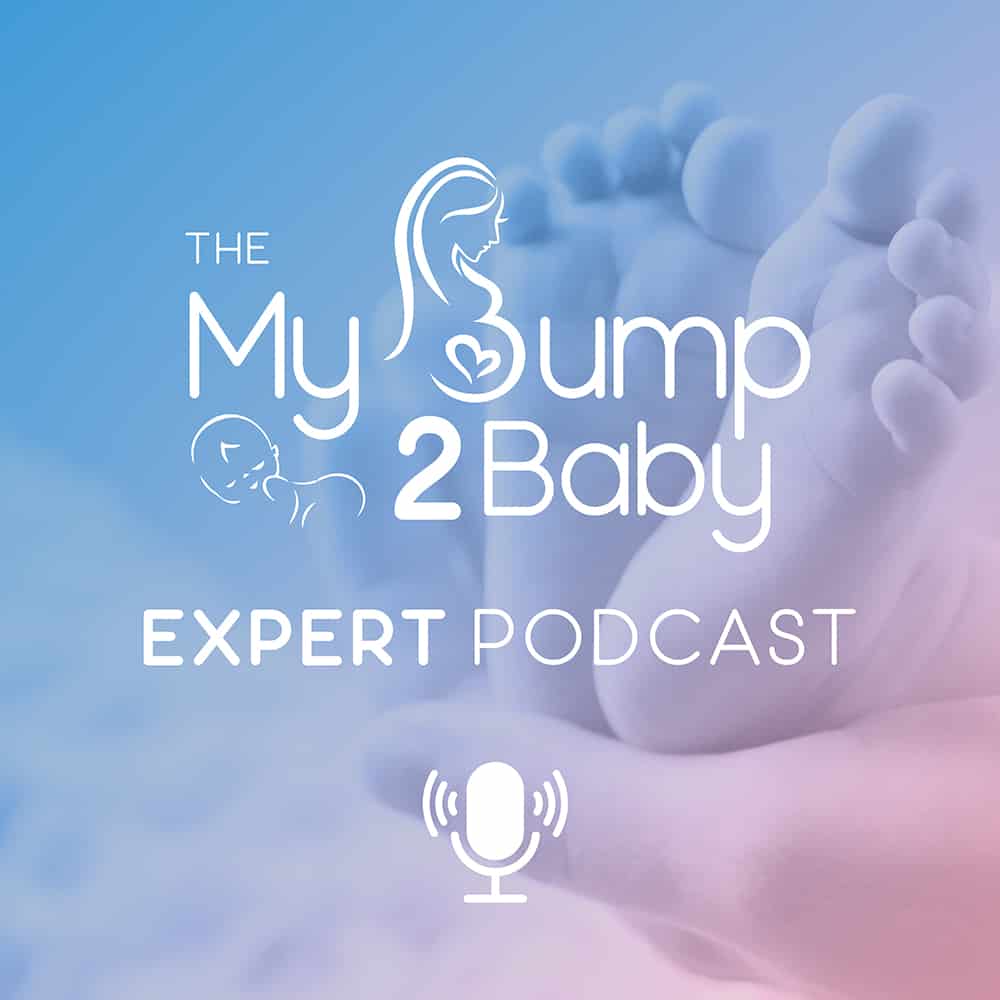- The Perfect Baby Bedtime Routine
Today we welcome on Lauren Peacock, a child sleep specialist from Little Sleep Stars. We talk about the baby bedtime routine, Lauren shares the importance of a baby bedtime routine and more about the benefits of being consistent with your bedtime routine. Lauren talks about when parents should think about introducing a bedtime routine. The perfect time to start the bedtime routine. What is the perfect bedtime routine including how long it should last and she also answers a commonly asked question many parents are dying to know…What age would a baby typically”sleep through”?
Here are Little Sleep Starts Social Links:
https://www.instagram.com/little_sleep_stars/
https://www.facebook.com/littlesleepstars/
You can find your nearest sleep consultant here:
https://www.mybump2baby.com/directory/baby-and-toddler/sleep-consultant
Carla [00:00:08] Hello and welcome to My Bump 2 Baby Expert podcast, where we bring experts from all over the UK to answer your questions on everything pregnancy to pre-school. Today is all about the baby bedtime routine, and we are joined by special guest and child sleep specialist Lauren Peacock from Little Sleep Stars.com.
Carla [00:00:50] Today, I’m joined by Lauren Peacock Child Sleep Specialist. Hi, Lauren.
Lauren [00:00:56] Hi. Thanks for having me.
Carla [00:00:58] You’re welcome. Yes, it’s lovely to have you on here. So today we’re going to be talking about the baby sleep bedtime routine. How important is a bedtime routine for baby’s sleep?
Lauren [00:01:10] So a bedtime routine for a baby or a child at any age, really, those younger children is super, super important. And it’s also super easy. So it’s a really easy and nice way of creating a very positive run into bed and to helping a little one settle to sleep well and to sleep well there after. One of the main reasons for that. And the thing to always remember is babies and young children cannot tell the time. So we might go to bed based on, oh, it’s 10 o’clock or it’s, you know, whatever time we will typically go to bed. And little ones don’t do that. They’re driven a lot more by what time it feels like. So by having a simple and positive and consistent bedtime routine, it really helps to queue children for what is coming next to start that wind down and to really start to gear themselves towards sleep. The other aspect to consider is that the consistency around a bedtime routine brings security. It allows children to ground and to anchor ahead of sleep, which is actually a huge period of separation for them from the primary caregivers, even if they’re not sleeping alone in their own room or anything night that there’s chunks of sleep mean that they are away from, the contacts that they that they might have with us. So the bedtime routine really allows them to anchor to us to connect and to ready themselves for that sleep separation.
Carla [00:02:52] Excellent. Thank you for that. When should a parent start introducing a bedtime routine, at what age?
Lauren [00:03:01] So I would say it’s never too early for bedtime routine. And it’s also never too late to to introduce one and see all the benefits of it. So I would say typical from as young as two to three weeks is a great time to implement a very simple bedtime routine. Is a bedtime routine going to help a three-week-old to sleep? Realistically, no, it isn’t. But if we commit to the same steps in the same order and we do that every day, sooner or later, a baby’s going to start associating that with what comes next. And the earlier we start that, the the earlier that that realisation is is going to happen or that association is going to happen. Similarly, if we, if you’re listening to this and you have an 18 month old or 2 year old and bedtime is a bit of a nightmare. And there isn’t really a routine there, it’s never too late to introduce the bedtime routine and to start to bring that structure and that calmness to the run into bed.
Carla [00:04:06] Excellent, excellent. And is there a particular time that you recommend starting a bedtime routine?
Lauren [00:04:14] So I would always say to be baby led and to to follow a baby’s cues. Now we’re looking at ideally getting a baby into bed when they are tired and before they are overtired because anybody who was tried to put an overtired baby to bed will know that that is a little bit like herding cats. It’s not an easy and easy task at all. So we’re looking for a bedtime routine, really for the babies and young children to be about 30 to 40 minutes before we want them to start the process of falling asleep. So being guided by baby, having a look at when they are naturally falling asleep because some families might be starting a bedtime routine at 6:30 because they’ve read that a 7 o’clock bedtime is is age appropriate for their child. If their child isn’t falling asleep until 8:30, then it would make sense to start from where you are and to track back from there and maybe start the bedtime routine roundabout in that scenario, 7:45, 7:50 and something like that. So you can be working towards 30 to 40 minutes after you start. And then a little one is beginning the process of falling asleep.
Lauren [00:05:27] Now, that said, children, young children and babies are typically natural larks, which means that their body clock manifests towards waking quite early for the day. Typically, between 6 and 7 is natural for most babies. And that leads to their consolidated period of sleep, their overnight sleep also starting in the early evening as we go through adolescence, that typically we make a shift from being a lark to being more of an owl [00:06:01]krona [0.0s] type, which means that we want to start sleeping in in the morning. We don’t want to be at between 6 and 7 and we would like to go to bed later. So we have to be guided by what is natural for our individual child rather than what might suit us to be their ideal routine. Sometimes babies are flexible and they could be on a 9, 9 type schedule. But the most literal ones and it being down to the night somewhere between 6 and 8 is going to be a more natural bed time for them.
Carla [00:06:36] Perfect. Thank you for that. And Lauren, what is the perfect routine and what does the perfect bedtime routine look like?
Lauren [00:06:46] So this is probably a bit of a politician’s answer, but it’s the routine that’s perfect for your child. So there are kind of some. I was going to say non-negotiables, nothing around sleep, which is non-negotiable, really. But there are some elements that typically will suit all children. But in terms of the steps within that time, routine is really about what needs to get done for a start, but also what does our child life can find. I’m calming and soothing in the run in to bed. So for some children, having a bath is a great part of a bedtime routine. But other children, actually, it works better to bath them earlier in the day. So there’s no kind of non negotiable elements from a bedtime routine. I would say in terms of the things to to really try to work towards length, as we’ve just mentioned, 30 to 40 minutes, if it goes on much longer than that, it stops being about the run in to bed. And rather than being links in the chain, things in the bedtime routine become activities in their own right. So the bath is a great example of this, I would say, for for a baby, five minutes in the bath for a slightly older child, 10 minutes. That’s probably a ballpark. Rather than being in the bath for half an hour, something like that. So keep in keeping it on track 30 to 40 minutes. I would say that the flow of the bedtime routine is really important as well. So I would always advise parents to go from the living area downstairs, wherever that may be, to the bathroom, complete everything that needs doing in the bathroom, and then move to the room where the child will be sleeping with no detours in between and particularly not going back to the daytime area, which a little one would associate with fun and bright lights and rather than the run in to bed. Lots of little ones, if they are tired when they come out of the bath and they might be crying at that point, something that is sometimes called bed begging, it makes sense to get them dressed in the bathroom and say that at the point you go through to the room where they will be sleeping. That’s when you can have a low light calm and the mood changes at that point. And that’s where the real wind down to sleep will kind of kick in. Keeping them lights down low will help little ones to stop producing or to ramp up their production of melatonin. The hormone that helps them to wind down and to feel sleepy. So spending some time in dimmed light in their room cuddles, stories, feeding whatever it is that needs to happen at the back end of the routine and doing that with low light will help. And if possible, I would say to have one parent dealing with things from the point you go into the child’s room. And that’s about that stimulation. It says to parents, all of us parents in and out, little ones will be. What? What’s that? What’s going on? Whats daddy going to do? What’s mummy doing? And rather than really winding down and calming and anchoring they are just starting to go the other way, the really, really important point about bedtime routine is that it’s very consistent, all the same steps in the same order. Now, this can be mind numbingly boring for parents at different stages. If you have had a toddler, you will know that they go through phases of wanting the same story every night for weeks on end. And for us, we think, do you not want a little bit of variety in your life? But for little ones it’s because they do crave predictability. They like knowing what’s going to happen when you turn the page. And they like knowing what’s coming. And if we think about that, actually, that makes a lot of sense because we make a lot of decisions for ourselves as adults. We have quite a lot of control over our own destiny and little ones don’t. Life happens to them. A lot of the time. So having things are very predictable and very consistent helps them to feel secure in that run in to bed. And I would keep it consistent down to saying good night to the same three things in the same order. And it might be mummy, daddy, the pet dog. It might be the moon, the stars, the streets. You know, it can be anything. It doesn’t. I mean, it could be anything at all. But it’s about the process. It’s about the little one knowing. Okay. This happens and then this happens and then this happens. And when they are right about that, they they tend to feel quite calm, quite anchored and quite secure. So all of that would culminate then in the little one, being ready for sleep and then falling asleep in whatever way is is working for an individual family. So a bedtime routine does not have to culminate in a child getting into their own bed and falling asleep there, that it can culminate in a child nursing to sleep, being rocked to sleep, held to sleep, whatever the falling asleep process looks like that that individual child is absolutely fantastic as long as it’s working for that child for that family. So the bedtime routine is about getting to that point consistently.
Carla [00:12:41] Excellent, excellent answers. I didn’t know any of that. So thank you so much. And what age would a baby typically start to sleep through, Lauren?
Lauren [00:12:54] Oh that’s the million dollar question. And it really depends a lot on the definition of sleeping through. So actually, what we tend to see with with young babies pre about four months is that typically initially they wake very frequently. They seemed very frequently. But then as they go from about six weeks onwards, they typically tend to start taking one consolidated jump or one longer chunk of sleep in 24 hours. And once they’ve established one nights and one day is that will typically be at night. So it’s not uncommon. And I work with loads of babies who by ten, eleven, twelve weeks might be sleeping for one chunk overnight or six, seven or even eight hours and an eight hours at that age for most families, feels like an absolute sleep through because they might be doing that from 10:00 p.m. to 6:00 a.m. as an example. Now that feels great from a parental sleep point of view. But actually it’s the point at which little ones are most vulnerable to SIDS or when their peak of SIDS actually happens. And that’s because babies, when they’re little, they don’t cycle through sleep. They’re either awake or they’re very deeply asleep. And so as that longer chunk of very deep sleep stretches out and that’s why the SIDS risk does creep up in that window. So then it all changes round about the four month mark, which people call a regression, because baby might go from sleeping in this big chunk to waking up very frequently, maybe two, three, four times a night, maybe as frequently as every hour. And understandably, that feels like things have gone backwards. They haven’t. They actually leapt forwards. Babies are no longer sleeping like teeny tiny newborns. They’re sleeping more like the rest of us. They’re cycling through lighter sleep periodically. Great. From a safe sleep point of view, because they are periodically checking in with themselves, their temperature, whether they have a need to be met and that it’s an inevitable progression is not a regression. It’s a progression in how they sleep. But normally, more frequent waking becomes a feature. Now, sleeping through is a complete misnomer, really, because it suggests that babies don’t wake babies who sleep through don’t wake and they do all babies, all humans wake in the night. It’s just that some babies will resettle those inevitable wakes without help and others won’t. And that feels like the difference between a baby who sleeps through and doesn’t. So a lot comes down to temperament and whether a baby is naturally a signaller or a settler. And that’s a term used by Lindsay Hookway to describe the difference between babies who seem to transition through sleep cycles really easily and without any help, and others who wake very frequently. And then once they’re awake, go, mummy, daddy, I’m awake. Come on, come and help me back to sleep. So it feels like some babies just we just have that ability more naturally than others. And it’s not normally anything that a parent has done differently. It’s not that one baby is a good baby. One baby isn’t or one parent is a good parent and the other parent isn’t that there’s a massive element of just a child’s natural relationship with sleep. So if we’ve got a little one who post four months, is waking two or three or four times in the night and they are looking for the same or similar help to they have to fall asleep at bedtime, whether that is being patted, whether it’s being nursed, whatever it may be, that baby is not broken. That baby has just made an inevitable progression in how they sleep. And they are sleeping on a biologically normal pattern. And if a parent wants to move that on, because maybe they have an older baby who is feeding very frequently through the night, maybe the daytime intake of milk is dropping off or mums going back to work. And it just doesn’t feel sustainable any more, then working on how that little one is able to fall asleep is often the key to them being able to resettle some or all of those inevitable wake ups when they come. For a little one who is waking very, very frequently and it might be every hour. We always want to check if everything else is is in order for them. Are they physically comfortable? Are they? And definitely not hungry. Are they well rested in the sense of not being over tired? And if all the same things asked are stacking up and babies still waking super frequently, then that can be a driver for a family to work on enabling their little one to make those sleep transitions, without help at every one of them a little bit more independently and therefore to be able to take those longer chunks of sleep. So that’s a really long way of answering what was a very common question. It’s not a simple question, because when a baby will sleep through is a lot to do with their individual biology, their temperament and their natural relationship with sleep. I have known babies as young as four months, I worked recently with four month old twins who were very able to go through the night with no feed even at that age. I work with babies of eight months, nine months, 10 months who have a genuine need for night feeds. So it really does move around. And one thing to always remember is that night feeds in the first year, particularly are biologically normal, and they’re very, very common.
Lauren [00:19:37] How a baby sleeps is only a problem, an issue if it’s not working for an individual family. If a family is happy with their sleep situation, it matters not whether that baby is waking more frequently, less frequently than the rest of their antenatal group or their friend’s sister’s baby or whatever, whatever it may be. The question is always, is this sleep situation bringing us as a family the rest that we need and if the answer to that is no. There are there are ways of gently working, working with that. But if you have a baby who doesn’t sleep through in inverted commas and the rest of your antenatal groups babies are. That’s not anything that a family is doing wrong. And it’s likely down to a difference in a child’s natural relationship with sleep.
Carla [00:20:33] Excellent. Wow. Thanks, Lauren. That is. Lots of information there for parents to use, so tell parents a bit more about what you do and where they can find you if they do need the support.
Lauren [00:20:47] So I can be found a little sleep stars and you can find us at www.littlesleepstars.com. Or over on Facebook and Instagram. So I work with children right from birth up to the age of 6 and I work remotely with parents, rather than going in and being hands on with little ones. And what I do is really equip parents with the tools, the confidence and the strategies and everything that they need to make informed decisions about how to turn around their sleep situation. So that might be working on helping a child sleep beyond 5:00 a.m. That’s a really common issue at the moment. Transitioning a little one into their own room, whatever it may be. And so I work as a say with babies, with toddlers, be slightly older children to help them fulfil their sleep potential and to improve sleep in a way that is gentle, that is holistic, and that doesn’t feel like an ordeal for anybody involved. That’s me. And that’s what you can find me.
Carla [00:21:59] Excellent. Excellent. And anyone who wants to find Lauren, we will have the show notes on on this subject as well. So you’ll just be able to click the link and make contact with her directly.
Carla [00:22:10] Thank you for listening to My Bump 2 Baby’s Expert podcast. If you would like to find help and support from experts in your local area. Head over to www.mybump2baby.com. And you will also be able to find local pregnancy to pre-school groups, classes, businesses and services in your local area.










